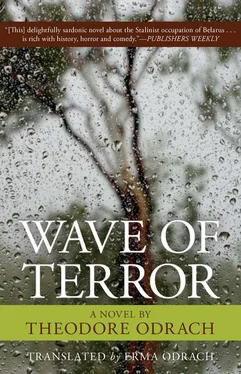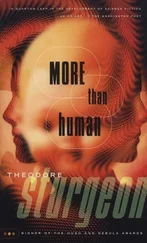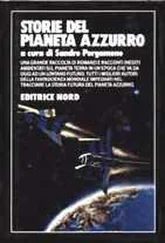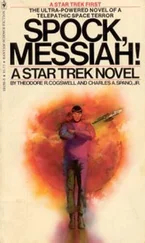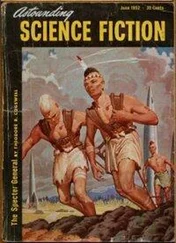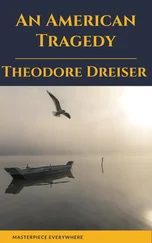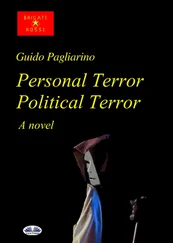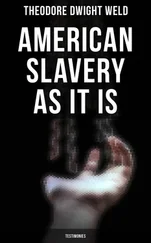Yeliseyenko turned deep crimson and there was a dark, cold look in his eyes. He was furious. How dare Kulik, a mere civil servant, question the decision of the all-powerful regime! He was about to go on the attack, maybe even start up a psychological game, when he stopped, suddenly feeling unsure. He had to deal cleverly with the adversary before him; the onus was on him not to let the party down, even for an instant. He could not afford to be outsmarted and made to look like a fool. He was a distinguished Soviet representative now and had responsibilities to fulfill; he had to be strong and in control at all times. The Party had, after all, entrusted him with this new and very significant position, and it was his duty to watch out for and report any signs of treason. Jotting something on a piece of paper, pretending to make notes, he glanced now and then at Kulik from the corner of his eye to see if he could detect some discomfort or even panic. But Kulik’s face remained blank.
Yeliseyenko began to recite standard Soviet phrases and slogans. Here he was in control. He shouted, “We live in the most democratic country in the world. The Soviet government is supreme. It ensures freedom and democracy to all the people of its republics. The Party is committed to preserving all national languages and promises to give special attention to schools, the sciences, and fine arts. All republics now stand firmly united under the sound protection of their older Russian blood brothers.”
As Yeliseyenko talked on, he slipped into fluent Ukrainian; from his accent it was evident he was from somewhere in the Kiev area. Kulik was astonished. Yeliseyenko bit his lower lip, red with rage and embarrassment. He had just given himself away. He had been confident that his performance as a true Muscovite was perfect. But now he was exposed, stripped of his dignity. And, to make matters worse, he had betrayed his beloved Party. He had revealed a crack in the Soviet system. He felt like a traitor.
This made Kulik even more anxious about his own immediate future. He didn’t believe a fellow countryman, out to prove himself to the Kremlin, would for one minute demonstrate compassion toward one of his own — quite the contrary, he would be more inclined to nail him to the ground. Kulik’s lips became parched; he felt as though he were being prodded by a pistol to go out into a courtyard somewhere, where a single, final bullet awaited him. He strained every faculty to stay on top of things. Pretending not to have noticed Yeliseyenko’s blunder, he shouted with a passion that amazed even himself, “Comrade Yeliseyenko, I am an honest and faithful citizen of our new and great Soviet Empire. I am proud to be a member of the most powerful mass movement in history, and I will fight alongside my blood brothers to the very end.”
“Well, well!” Yeliseyenko clapped his hands, delighted. “It’s good to hear you express such encouraging views. I commend you for them.” Then, frowning, “Only I don’t commend you for your teaching habits. When you return to your school, you are no longer to teach in Ukrainian. Is that understood? You are not to use Ukrainian under any circumstance. I am well aware you have no knowledge of the Belorussian language, but don’t worry, that’s not a problem. We’re a nation of Soviet peoples and all Soviet peoples must speak Russian, first and foremost. In short, you will be teaching the children of Hlaby in Russian, which I understand you speak fluently.”
Kulik sank back in his seat, and nodded. So that was their plan. Languages of the republics were to be encouraged, but only on a superficial level; Russian was to be extended in all spheres of social life. Talk of preserving ethnicity was a sham.
Yeliseyenko went on. “Allow me to speak candidly, Comrade Ivan. I know you’re a historian with a degree from the university in Vilno — a fact, I might add, which is not to your credit. To put it simply, you have an education from a bourgeois institution where you were taught not only by non-socialist professors but also by pretentious, self-serving priests. You were educated in a hostile and unproductive environment. Take my advice and study the five volumes of Soviet history. Become a master of Marxist methodology and learn how to approach the phenomenon of scientific socialism; come to understand thoroughly the history of struggles between the ruling and exploited classes. Give added attention to the Communist Manifesto, and learn how the capitalist classes of all nations will be overthrown and eliminated by a worldwide working-class revolution.”
Yeliseyenko, to Kulik’s surprise, sounded almost friendly. “Should you succeed in re-educating yourself, I may in the near future be able to recommend you for promotion to some higher institution like a gymnasium here in Pinsk or a university in some other city. Do you understand what I’m getting at? Now I suggest you knock on that door.” He pointed to the left, to a narrow gray door that appeared to lead to a closet or storage room. Kulik had not noticed it. “My secretary will prepare the specified books for you. Good day to you, comrade.”
Kulik got up and made his way across the room. He felt a tremendous weight lifted from his shoulders. For today at least he could consider himself out of jeopardy. Nothing concrete had been compiled against him. He had to remind himself that it might be just a matter of time before they went after him again.
He knocked on the door, and opened it. Before he could enter, a woman rose from behind her desk and walked toward him. She wore a dark blue suit with cuffs, a white cotton blouse and black flat-heeled shoes laced up the front. She was tall and pretty and wore her hair pulled back from her face into a bun. It was Zena. Without so much as a nod, she walked over to Yeliseyenko’s desk and handed him a folder with papers in it. The two put their heads together and exchanged several words. Then Zena turned toward her office door, and in a soft but official tone, asked Kulik to follow her.
Her office was small and dim; light from a narrow window seemed to stop at the pane. Her desk, with an Olympia typewriter and two black gooseneck lamps, was half the size of Yeliseyenko’s, and its piles of papers were neat and looked well-organized. A grained pine bookcase occupied one wall and on another was a clock next to a framed photograph of Stalin.
Slipping a blank sheet of paper into her typewriter, Zena rapidly hit the keys. Ten minutes passed, then another ten. Somewhat irritated, Kulik said carefully, “Excuse me, but am I to be here much longer? I have lectures to attend.”
Zena did not answer. She made notes in a logbook, then typed a few more pages. Another ten minutes went by, and at last, without looking up, she said in Russian, without a trace of an accent, “The order for your school is complete. Exercise books, Russian dictionaries, pens, textbooks, slates …” As she leafed through the list, she raised her brows. “A magnifying glass, a telescope … hmm … strange. Are you a naturalist of some sort?”
“No, not really. Actually, history is my weakness. Greek mythology, to be exact.” Kulik was amused by her interest, which seemed to be candid and genuine. Their eyes met and she smiled. She was not the cold, oblivious government worker of just a few minutes ago. Who was this girl? What was going on in her mind? She turned away, and began to immerse herself in her papers. She avoided looking at him. Kulik felt impelled to try to get some kind of response from her. He started to talk about Greek mythology.
“Are you familiar with Greek mythology? Yes? Do you remember when Zeus, god of the sky and ruler of the Olympian gods, fell in love with the beautiful Europa, daughter of Agenor the Phoenician king of Tyre? While she gathered flowers by the seashore, he appeared before her in the guise of an exquisite white bull, and enticed her to climb onto his back. Then he sped away with her across the ocean to Crete …”
Читать дальше
